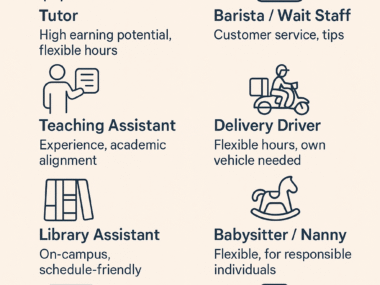MOST IN-DEMAND JOBS IN THE UK—WORK IN UK

The most in-demand jobs in the UK, exploring sectors showing strong growth, the skills employers are seeking, salary expectations, hiring trends tied to emerging technologies, and advice for job seekers navigating today’s labor market.
1. Technology & IT
a. Software Developers/Engineers
- Why it’s booming: The UK’s tech ecosystem—spanning fintech, e-commerce, gaming, edtech, and healthtech—is projected to be worth around £180 billion. Since 2022, tech job postings have surged by nearly 28%, with about 120,000 developer roles expected by 2025.
- In-demand skills: JavaScript, Python, Java, Git, cloud platforms (AWS/Azure), and Agile methodologies.
- Salary range: £35K–£70K for mid-level roles; senior positions reach higher (some above £80K). Entry-level: £30K–£45K.
- What’s changing: Basic coding tasks are declining due to AI, but complex development, system design, and full-stack roles remain strong.
b. Data Analysts & Data Scientists
- Why it matters: As businesses become data-centric, roles in data science and analytics are critical for guiding decision-making. Around 30–60K salaries are typical for analysts, while scientists can expect upwards of £45–85K.
- Key tools: SQL, Python, R, Excel, machine learning, and statistical modeling.
- Job outlook: Even senior roles in data engineering, business intelligence, and AI modeling are in constant demand.
c. Cybersecurity Professionals
- Demand drivers: With cyber threats rising and AI-driven attacks emerging, the need for skilled cyber defenders is critical.
- Vacancies: An estimated 17,000 current openings and a projected 10–12% annual growth in cybersecurity staffing.
- Roles and salary: penetration testers, SOC analysts, cloud security, and AI threat intelligence. Salaries range from £40K to £90K+.
- Required credentials: certifications like CISSP, CEH, and CompTIA Security+, and practical experience via platforms like TryHackMe.
d. Cloud Engineers
- Why needed: The transition to digital infrastructures is fueling demand for professionals who manage cloud computing environments.
- Salary: Average around £54K, with experienced professionals sometimes earning up to £145K.
- Skills: AWS/Azure/Google Cloud, Terraform, Kubernetes, DevOps practices.
e. AI & Machine Learning Engineers
- Growth area: AI adoption soared ~21% from 2018 to 2023; employers are increasingly hiring based on AI skills rather than degrees.
- Salary: Entry at £40K–£80K, with rapid growth expected.
- Expertise: Deep learning, natural language processing, neural networks, and algorithmic model building.
2. Healthcare & Medical Jobs
a. Nurses, Doctors & Allied Health Professionals
- Reason for demand: An aging population, increasing mental health and long-term care needs, and chronic NHS vacancies (e.g. shortage of ~50,000 nurses by 2025).
- Vacancy trends: Healthcare roles are officially listed on the Shortage Occupation List and projected to grow 10% yearly.
- Salary ranges: Nurses £25K–£45K; doctors £50K–£100K+; allied roles like physiotherapists typically £30K to £50K.
- Licensing: Registration required (NMC for nurses, GMC for doctors), plus healthcare software proficiency (e.g., EPR systems).
b. Social Workers & Community Health Roles
- Increased demand within NHS and social care settings for registered social workers, health data analysts, healthcare IT professionals, and community mental health roles.
3. Education & Teaching
- STEM Teachers (math, physics, chemistry, computer science): Persistent shortages with average salaries of £30K–£50K; SEN specialists needed (up to £55K).
- Educational Psychologists & Digital Learning Specialists: Roles with salaries around £38K–£55K, driven by demand for inclusive education and edtech innovation.
- Qualifications & routes: Bachelor’s in relevant subject, PGCE/QTS; plus for SENCO, must have SENCO qualification; online teacher training (Teach First, School Direct).
4. Engineering & Construction
- Background: Massive projects (HS2, nuclear, renewable energy, modular housing) are driving infrastructure jobs.
- Core roles and salaries:
- Civil engineers: £35K–£60K
- Electrical engineers: £40K–£65K
- Mechanical engineers: £38K–£62K
- Quantity surveyors: £42K–£70K
- BIM specialists: £45K–£65K
- Sustainability engineering: Green retrofit specialists and environmental systems engineers hit increasing demand due to net-zero efforts.
5. Sustainability & Green Roles
a. Sustainability Managers/Consultants
- Why needed: The UK’s legal net-zero targets and ESG pressures are driving ~40% hiring increases and ~80,000 new roles projected by 2025.
- Salary: £40K–£65K.
- Skills: Carbon auditing, ESG reporting, regulatory compliance, and project management. Certifications (IEMA) and environmental science degrees are beneficial.
b. Environmental Officers & Energy/Carbon Managers
- Focus: Overseeing emissions, waste, utilities, and climate risk. Growth driven by corporate environmental strategy.
- Salary: Typically £35K–£60K.
c. Renewable Energy Engineers
- Projects in wind, solar, and hydropower continue to grow. Salary range: £35K to £65K .
- Skills: Electrical engineering, project planning, environmental assessment.
6. Finance & Professional Services
a. Financial Analysts, Accountants, Compliance Officers, Risk Managers
- London remains a global finance hub. Pros in fintech, regulation, risk management, and environmental finance are in demand.
- Salaries: £40K–£100K+ depending on role and experience (e.g., senior risk managers/heads of operations can earn £120K to £160K).
b. Green Finance Advisors
- Professionals advising on sustainable investment strategies are increasingly sought, with salaries around £40K to £75K.
7. Logistics, Supply Chain & Trade
- Resilience and efficiency of supply chains have become critical. Managers and analysts in logistics, procurement, inventory, and ERP systems remain in demand with salaries roughly £30K to £65K.
8. Creative & Digital Media
- Marketing and digital specialists (SEO, content, social media) are in rising demand as online commerce grows; roles are often open to non-degree backgrounds.
- Videographers, designers, writers, and VFX professionals benefit from creative sector growth supported by government and private investment.
9. Skilled Trades & Technicians
- Shortages in electricians, plumbers, and carpenters—driven by construction demand and infrastructure needs.
- Competitive salaries, flexibility for self-employment, and apprenticeship pathways.
a. Aircraft Mechanics
- Aviation recovery is driving the need for thousands of maintenance engineers (globally, 716,000 over 20 years); UK demand is strong.
LABOUR MARKET FORCES & TRENDS
AI & Automation
- AI (e.g., ChatGPT) has reduced entry-level roles by ~32% since late 2022.
- While generative AI automates repetitive tasks, it also boosts opportunities in AI-savvy roles (+25% freelance earnings in AI-related gigs)
Skills-Based Hiring
- Employers are shifting towards skill-based hiring, especially in AI and green sectors—degree requirements are decreasing in favor of demonstrable abilities; AI skills yield a ~23% wage premium.
Veteran Recruitment
- UK firms are recognizing the leadership and discipline veterans bring; initiatives like “Op Ascend” encourage veteran hiring, showcasing strong performance benefits.
Regional Tech Hubs & Infrastructure
- Investment in tech hubs outside London (e.g., Hull, Northampton, East Midlands, and Motherwell) is creating thousands of jobs in AI, cloud, logistics, and data services.
- Urban densification and secondary city development (e.g., Birmingham, Manchester) aim to enhance productivity by clustering talent.
SALARY OVERVIEW AT A GLANCE
| Sector/Role | Entry (K) | Mid (K) | Senior (K+) |
|---|---|---|---|
| Software Developer | 30–45 | 40–70 | 80+ |
| Data Scientist | 30–60 | 45–85 | 90+ |
| Cybersecurity Analyst/Engineer | 40–60 | 50–90 | 100+ |
| Cloud Engineer | 50–75 | 70–145 | 150+ |
| AI/ML Engineer | 40–80 | 80–100+ | 100+ |
| Nurse | 25–45 | 40–55 | 60+ |
| Doctor | 50–100+ | — | — |
| STEM Teacher | 30–50 | 40–60 | 60+ |
| Civil/Electrical/Mechanical Engineer | 35–60 | 60–80 | 90+ |
| Sustainability/Env’ Consultant | 35–60 | 60–75 | 90+ |
| Financial/Risk Manager | 40–80 | 80–120 | 120–160 |
| Skilled Trades (Electrician, etc.) | 25–40 | 40–60 | 60+ |
TIPS FOR JOB SEEKERS
- Skill-based focus: Build hands-on experience—bootcamps, online projects, apprenticeships (especially in AI, cloud, cybersecurity, and green jobs).
- Certifications: Prioritize recognized credentials (AWS/Azure, CISSP, CEH, IEMA).
- Regional exploration: Don’t limit yourself to London—tech jobs are springing up in Hull, Manchester, Edinburgh, and the central belt of Scotland.
- Veteran advantages: If you have a military background, showcase leadership and resilience—programs like Op Ascend support transitions.
- AI literacy: Learn to work with AI—complex roles thrive and yield higher pay; basic tasks are increasingly automated.
- Green career paths: Sustainability, environmental compliance, and green project roles are projected to grow with net-zero mandates.
The Future of UK Employment
- Tech & AI: Growth Even as automation shifts the landscape, demand for advanced roles continues.
- Healthcare & Education: Chronic staffing shortages ensure long-term opportunities, especially for qualified professionals.
- Infrastructural & green transitions: Net-zero goals and major civil engineering projects are creating a wealth of jobs in engineering, sustainability, and construction.
- Finance & professional services: While slowly transformed by fintech and ESG, these sectors remain robust in London and emerging business hubs.
- Creative & digital marketing: Remote roles, skill-first hiring, and online-enabled services are driving opportunity.
CONCLUSION
The UK job market in 2025 favors technological fluency, specialized skills, and adaptability. Degrees still matter—particularly in professions like medicine, engineering, and teaching—but credentials are increasingly complemented or replaced by practical experience and certifications. Whether you’re entering the workforce, pivoting careers, or upskilling, understanding these key sectors and aligning with growth areas (AI, cybersecurity, green tech, healthcare, infrastructure) will position you for opportunity in the evolving UK labor landscape.
![]()





1 comment